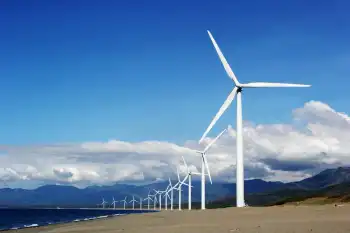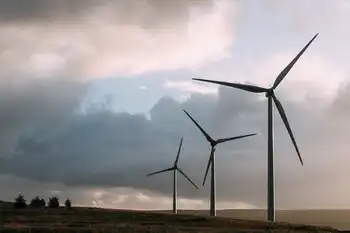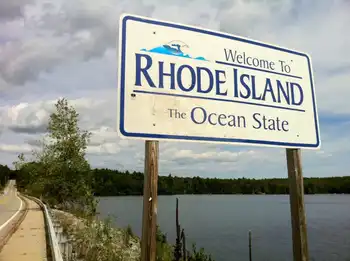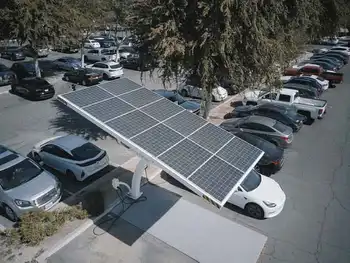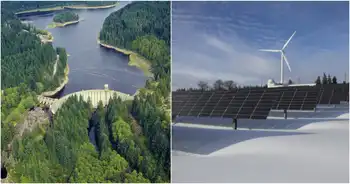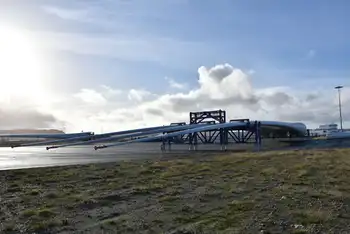Texas High Plains Wind Energy faces ERCOT transmission congestion, limiting turbines in the Panhandle from stabilizing the grid as gas prices surge, while battery storage and solar could enhance reliability and lower power bills statewide.
Key Points
A major Panhandle wind resource constrained by ERCOT transmission, impacting grid reliability and electricity rates.
✅ Over 11,000 turbines can power 9M homes in peak conditions
✅ Transmission congestion prevents flow to major load centers
✅ Storage and solar can bolster reliability and reduce bills
Texas’s High Plains region, which covers 41 counties in the Texas Panhandle and West Texas, is home to more than 11,000 wind turbines — the most in any area of the state.
The region could generate enough wind energy to power at least 9 million homes. Experts say the additional energy could help provide much-needed stability to the electric grid during high energy-demand summers like this one, and even lower the power bills of Texans in other parts of the state.
But a significant portion of the electricity produced in the High Plains stays there for a simple reason: It can’t be moved elsewhere. Despite the growing development of wind energy production in Texas, the state’s transmission network, reflecting broader grid integration challenges across the U.S., would need significant infrastructure upgrades to ship out the energy produced in the region.
“We’re at a moment when wind is at its peak production profile, but we see a lot of wind energy being curtailed or congested and not able to flow through to some of the higher-population areas,” said John Hensley, vice president for research and analytics at the American Clean Power Association. “Which is a loss for ratepayers and a loss for those energy consumers that now have to either face conserving energy or paying more for the energy they do use because they don’t have access to that lower-cost wind resource.”
And when the rest of the state is asked to conserve energy to help stabilize the grid, the High Plains has to turn off turbines to limit wind production it doesn’t need.
“Because there’s not enough transmission to move it where it’s needed, ERCOT has to throttle back the [wind] generators,” energy lawyer Michael Jewell said. “They actually tell the wind generators to stop generating electricity. It gets to the point where [wind farm operators] literally have to disengage the generators entirely and stop them from doing anything.”
Texans have already had a few energy scares this year amid scorching temperatures and high energy demand to keep homes cool. The Electric Reliability Council of Texas, which operates the state’s electrical grid, warned about drops in energy production twice last month and asked people across the state to lower their consumption to avoid an electricity emergency.
The energy supply issues have hit Texans’ wallets as well. Nearly half of Texas’ electricity is generated at power plants that run on the state’s most dominant energy source, natural gas, and its price has increased more than 200% since late February, causing elevated home utility bills.
Meanwhile, wind farms across the state account for nearly 21% of the state’s power generation. Combined with wind production near the Gulf of Mexico, Texas produced more than one-fourth of the nation’s wind-powered electric generation last year.
Wind energy is one of the lowest-priced energy sources because it is sold at fixed prices, turbines do not need fuel to run and the federal government provides subsidies. Texans who get their energy from wind farms in the High Plains region usually pay less for electricity than people in other areas of the state. But with the price of natural gas increasing from inflation, Jewell said areas where wind energy is not accessible have to depend on electricity that costs more.
“Other generation resources are more expensive than what [customers] would have gotten from the wind generators if they could move it,” Jewell said. “That is the definition of transmission congestion. Because you can’t move the cheaper electricity through the grid.”
A 2021 ERCOT report shows there have been increases in stability constraints for wind energy in recent years in both West and South Texas that have limited the long-distance transfer of power.
“The transmission constraints are such that energy can’t make it to the load centers. [High Plains wind power] might be able to make it to Lubbock, but it may not be able to make it to Dallas, Fort Worth, Houston or Austin,” Jewell said. “This is not an insignificant problem — it is costing Texans a lot of money.”
Some wind farms in the High Plains foresaw there would be a need for transmission. The Trent Wind Farm was one of the first in the region. Beginning operations in 2001, the wind farm is between Abilene and Sweetwater in West Texas and has about 100 wind turbines, which can supply power to 35,000 homes. Energy company American Electric Power built the site near a power transmission network and built a short transmission line, so the power generated there does go into the ERCOT system.
But Jewell said high energy demand and costs this summer show there’s a need to build additional transmission lines to move more wind energy produced in the High Plains to other areas of the state.
Jewell said the Public Utility Commission, which oversees the grid, is conducting tests to determine the economic benefits of adding transmission lines from the High Plains to the more than 52,000 miles of lines that already connect to the grid across the state. As of now, however, there is no official proposal to build new lines.
“It does take a lot of time to figure it out — you’re talking about a transmission line that’s going to be in service for 40 or 50 years, and it’s going to cost hundreds of millions of dollars,” Jewell said. “You want to be sure that the savings outweigh the costs, so it is a longer process. But we need more transmission in order to be able to move more energy. This state is growing by leaps and bounds.”
A report by the American Society of Civil Engineers released after the February 2021 winter storm stated that Texas has substantial and growing reliability and resilience problems with its electric system.
The report concluded that “the failures that caused overwhelming human and economic suffering during February will increase in frequency and duration due to legacy market design shortcomings, growing infrastructure interdependence, economic and population growth drivers, and aging equipment even if the frequency and severity of weather events remains unchanged.”
The report also stated that while transmission upgrades across the state have generally been made in a timely manner, it’s been challenging to add infrastructure where there has been rapid growth, like in the High Plains.
Despite some Texas lawmakers’ vocal opposition against wind and other forms of renewable energy, and policy shifts like a potential solar ITC extension can influence the wind market, the state has prime real estate for harnessing wind power because of its open plains, and farmers can put turbines on their land for financial relief.
This has led to a boom in wind farms, even with transmission issues, and nationwide renewable electricity surpassed coal in 2022 as deployment accelerated. Since 2010, wind energy generation in Texas has increased by 15%. This month, the Biden administration announced the Gulf of Mexico’s first offshore wind farms will be developed off the coasts of Texas and Louisiana and will produce enough energy to power around 3 million homes.
“Texas really does sort of stand head and shoulders above all other states when it comes to the actual amount of wind, solar and battery storage projects that are on the system,” Hensley said.
One of the issues often brought up with wind and solar farms is that they may not be able to produce as much energy as the state needs all of the time, though scientists are pursuing improvements to solar and wind to address variability. Earlier this month, when ERCOT asked consumers to conserve electricity, the agency listed low wind generation and cloud coverage in West Texas as factors contributing to a tight energy supply.
Hensley said this is where battery storage stations can help. According to the U.S. Energy Information Administration, utility-scale batteries tripled in capacity in 2021 and can now store up to 4.6 gigawatts of energy. Texas has been quickly developing storage projects, spurred by cheaper solar batteries, and in 2011, Texas had only 5 megawatts of battery storage capacity; by 2020, that had ballooned to 323.1 megawatts.
“Storage is the real game-changer because it can really help to mediate and control a lot of the intermittency issues that a lot of folks worry about when they think about wind and solar technology,” Hensley said. “So being able to capture a lot of that solar that comes right around noon to [1 p.m.] and move it to those evening periods when demand is at its highest, or even move strong wind resources from overnight to the early morning or afternoon hours.”
Storage technology can help, but Hensley said transmission is still the big factor to consider.
Solar is another resource that could help stabilize the grid. According to the Solar Energy Industries Association, Texas has about 13,947 megawatts of solar installed and more than 161,000 installations. That’s enough to power more than 1.6 million homes.
This month, the PUC formed a task force to develop a pilot program next year that would create a pathway for solar panels and batteries on small-scale systems, like homes and businesses, to add that energy to the grid, similar to a recent virtual power plant in Texas rollout. The program would make solar and batteries more accessible and affordable for customers, and it would pay customers to share their stored energy to the grid as well.
Hensley said Texas has the most clean-energy projects in the works that will likely continue to put the region above the rest when it comes to wind generation.
“So they’re already ahead, and it looks like they’re going to be even farther ahead six months or a year down the road,” he said.
Related News
